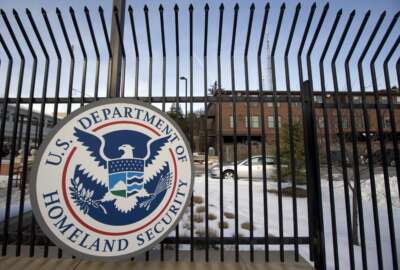Senator wants to know what agencies are doing to protect employee cell phones
In today's Federal Newscast, Senator Ron Wyden wants to know what a handful of agencies are doing to deploy countermeasures and protect employees and critical...
To listen to the Federal Newscast on your phone or mobile device, subscribe in PodcastOne or Apple Podcasts. The best listening experience on desktop can be found using Chrome, Firefox or Safari.
- Very little, if anything, is being done to protect federal employees and facilities from cell phone surveillance technology creating counterintelligence threats. So says Sen. Ron Wyden (D-Ore.) in a letter to six agencies, including the departments of Defense, State and Homeland Security. Wyden says cell phones can be tracked and calls and texts can be intercepted by cell site simulators. Wyden wants to know what these agencies are doing to deploy countermeasures and protect employees and critical facilities. Wyden asked for a response from these agencies by Dec. 10.
- The first shoe dropped yesterday amid the numerous lawsuits challenging the Biden Administration’s vaccine mandate for federal contractors. A federal judge issued a preliminary injunction blocking the government from enforcing the mandate in Kentucky, Ohio and Tennessee. Those three states are among many who’ve sued over the vaccine requirement. Similar injunctions are still pending in Arizona, Florida, Texas, Georgia and Missouri. The court found President Biden didn’t have the authority to use the procurement system to impose what amounts to a public health regulation. (Federal News Network)
- The Marine Corps is known for being tough, and it’s taking that reputation seriously when it comes to vaccine exemptions. It’s deadline for troops to be fully vaccinated passed on Nov. 28. 95% of marines got at least one shot by the deadline, leaving thousands in breach of orders. Most of marines will come into compliance soon by getting the second shot. The service has processed about 1,900 requests for religious exemptions to the COVID-19 vaccine. It’s granted exactly zero. There are still about 500 requests waiting to be scrutinized. So far, 14 medical exemptions have been granted. There are about 750 temporary medical and administrative exemptions as well. (Federal News Network)
- A large group of lawmakers are trying to get one of the biggest changes to military justice over the finish line. 66 senators and representatives are advocating to keep language in the 2022 defense authorization bill that would take serious, nonmilitary crimes out of the chain of command. The lawmakers are worried the provision might get watered down or even stripped from the bill. The House has already passed its version of the legislation; the Senate may pass its copy by the end of the week.
- A coalition of over a dozen federal employee unions and organizations is urging Senate leadership to confirm the president’s nominees for the Merit Systems Protection Board. The groups want Senate Majority Leader Chuck Schumer (D-N.Y.) and Minority Leader Mitch McConnell (R-Ky.) to schedule votes as soon as possible. The MSPB is approaching five years without a quorum. The president’s three nominees to restore a MSPB quorum are pending in the Senate. The Federal-Postal Coalition includes the National Federation of Federal Employees, the National Treasury Employees Union and the Senior Executives Association.
- President Joe Biden is putting a new leader in charge of overseeing federal land and building development in the national capital region. Biden is appointing Beth White, president of the nonprofit Houston Parks Board, to serve as chairwoman of the National Capital Planning Commission. White has served on the commission since 2012, and currently holds the title of vice chairwoman. The commission reviews plans for federal building projects, and serves as the federal government’s advocate for other major redevelopment projects in the D.C. metro area.
- The Pentagon’s top acquisition job has been vacant since the start of the Biden administration. That may be about to change. The White House says the president plans to nominate Dr. Bill LaPlante as undersecretary of defense for acquisition and sustainment. LaPlante served as the Air Force’s top acquisition official during the Obama administration. Since then, he’s been working as a senior official at Draper Laboratory, and before that, at the MITRE Corporation.
- A government watchdog says key U.S. cyber agencies need to improve how they work together. The Cybersecurity and Infrastructure Security Agency needs to boost its efforts to collaborate and coordinate with the Defense Department. That’s according to the Department of Homeland Security’s Office of Inspector General. In a new report, the OIG says CISA has fallen short in its commitments to work more closely with the National Security Agency and U.S. Cyber Command on cyber defense initiatives. The agencies have previously agreed to work together to exchange analysts, prepare for significant cyber incidents and protect critical infrastructure. CISA agreed with the OIG’s recommendations to monitor the progress of the interagency plans and establish new performance measures.
- The National Institute of Standards and Technology has some tips on how to secure your office’s smart refrigerator, and other Internet of Things devices. NIST released a new special publication this week on “IoT Device Cybersecurity Guidance for the Federal Government.” The document is supposed to help organizations confidently introduce interconnected devices into their larger IT ecosystems. But many IoT products can collect sensitive data on people and their environment. Other risks include the potential for the devices to interfere with network reliability.
- The top Republican on the Senate Homeland Security and Governmental Affairs Committee is looking to tighten the rules for providing cloud services to the federal government. The Federal Secure Cloud Improvement and Jobs Act would codify the FedRAMP cloud security authorization program into law, and has bipartisan support from the committee. But Ranking Member Rob Portman (R-Ohio) says he’s looking to tweak the bill and change how Third-Party Assessment Organizations vet products from cloud service providers. The bill passed the House as part of its version of this year’s National Defense Authorization Act. (Federal News Network)
- It’s taking longer for beneficiaries to get important information and mail from the Department of Veterans Affairs. VA says the delays stem from supply chain problems and staffing shortages with the vendor the Government Publishing Office uses to print and mail letters on behalf of the department. VA will give veterans more time to respond to delayed mail. Those with letters dated between July 13, 2021 and the last day of the year will have an extra 90 days to respond. VA won’t reduce, end or deny benefits to veterans who don’t respond to time-sensitive notifications.
- President Biden signed two veterans bills yesterday. One requires a Government Accountability Office study on race and ethnicity and benefits at the Department of Veterans Affairs. The second bill is designed to help VA more proactively hire health care professionals. The legislation lets VA identify separating service members in health care for potential employment at the department. Both bills have bipartisan support.
- The Department of Homeland Security has some ideas on how to modernize the civil service. The DHS officials who developed the new cyber talent management system say other agencies could borrow the lessons they learned for their own civil service modernization efforts. The new cyber talent system will recruit, hire, pay and promote new employees in a completely different way from the rest of the federal government. DHS says they’d like to see other agencies borrow pieces of the new system for their own missions. Applications for the new DHS cybersecurity service are open now. (Federal News Network)
- Key pieces of the Cybersecurity Maturity Model Certification program are back in wait-and-see mode. The training materials and courses for the Defense Department’s CMMC program are on pause for a few more weeks until documentation reflecting version 2.0 is ready. The CMMC Accreditation Body says they expect DoD to release updated materials in the coming weeks that will inform training courses for practioners and assessors under the revamped CMMC model. The board still expects the demand to outweigh the supply of third-party assessors and trainers of C3PAOs. DoD rolled out version 2.0 of CMMC in early November. Additionally, DoD is considering incentives, particularly for small businesses, to ease the burden of this cybersecurity effort.
Copyright © 2025 Federal News Network. All rights reserved. This website is not intended for users located within the European Economic Area.
Eric White
Eric White is news anchor and Federal Drive producer at Federal News Network.
Follow @FEDERALNEWSCAST






